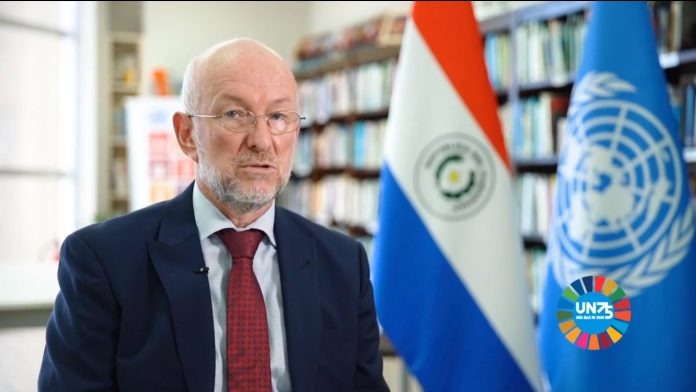Written by Mario Samaja, United Nations Resident Coordinator in Paraguay
Today, the United Nations has reached 78 years of existence. As many of you know, the UN started as a dream of 51 countries hoping for a fairer world with no wars, in which countries and people live in harmony and with plain access to their rights and prosperity. Among those 51 first countries was Paraguay, a founder member of the UN.
Today, the member states that constitute this big family are 193, which act through a complex structure whose main organs are the General Assembly, the Security Council, the Economic and Social Council, the Human Rights Council, and many other forums and commissions that are part of this great system.
Beyond the organs, mechanisms, and treaties globally, numerous agencies, funds, and programs are part of the organization, aiming to apply these values and decisions of political organs and the proposals of country members. In Paraguay, we have 18 agencies, funds, and programs, and the remote support of other entities such as the Economic Commission for Latin America and the Caribbean (ECLAC) and the Department of Economic and Social Affairs (DESA).
The work of the United Nations team in the country is positioned in support of national priorities and the National Development Plan through a framework of five-year cooperation with Paraguay’s Government. The current framework ends in 2024, and we are working on the following framework elaboration phase, a joint work between Paraguay’s Government and the United Nations system. It is a critical process that will allow us to align the work of the UN with national priorities and define common objectives.
The basic principles of the UN are translated on the ground into three significant areas of work: 1. The search for peace and security; 2. Human rights and humanitarian assistance, and 3. Sustainable and inclusive development.
Almost 80 years after the foundation of our organization, the challenges are still considerable. We are facing a world where every day is questioned the value of peace, multilateralism, and human rights validity. We are living in a time in which, with alarming frequency, new and profound crises break out with unprecedented violence in different parts of the world.
New and profound crises that, among countless and terrifying consequences, generate incalculable suffering to extensive civilian populations. Also, these recent crisis makes us gradually forget other pre-existing tragic situations, which, in a certain way, become part of the «forgotten,» or worse, of the «normal.» Today, for example, the daily news stream shows that an Afghanistan earthquake goes almost entirely unnoticed.
In this context of enormous concern at a global level, it is more than ever necessary to reaffirm and consolidate the values of multilateralism, the fundamental principles of the UN charter, and the Universal Declaration of Human Rights, among other essential multilateral tools.
Nevertheless, despite difficulties, the UN keeps defending peace, freedom, equality, inclusion, and access to rights and necessities for everyone, without differentiating on age, origin, sex, skin color, religion, or political beliefs. The UN continues trying to solve conflicts between countries or nationalities, internal disputes, and others, even in the context of the most severe, recent, and chronic conflicts.
From 2015, we have collectively advocated to accompany the countries to achieve the 17 Sustainable Development Goals, the SDGs. A commitment of the country members of the United Nations was approved unanimously by the General Assembly as a route path to achieve sustainable and inclusive development.
Maybe in times of doubt and politicization, of the rejection of the 2030 Agenda, it is time to remind that the agenda was not only approved unanimously but was elaborated through a profound and inclusive process, with the participation of all state members (including Governments and civil society of the world).
The central motto of «leaving nobody behind» wants to remind us, once again, that we must not forget or exclude any sector, we must not exclude anybody, as our grandparents who conceived this organization dreamed, and that today is as necessary as it was 80 years ago.
Before turning to the words of Secretary-General Antonio Guterres, I want to thank Paraguay’s Government for its collaboration and cooperation and to reiterate the UN’s commitment to working together for the sustainable and inclusive development of the country.
And I would like to finish these words with the reflections of our Secretary-General, António Guterres:
Secretary-General António Guterres’s message on United Nations Day
The United Nations is a reflection of the world as it is – and an aspiration of the world we know it can be.
It is our responsibility to help build that world of peace, sustainable development and human rights for all.
I know we can do it. The Charter of the United Nations – which entered into force 78 years ago today – points the way.
Above all, it is rooted in a spirit of determination to heal divisions, repair relations, and build peace.
To expand opportunities, and leave no one behind.
To ensure justice, equality and empowerment for women and girls.
To provide life-saving relief to those in need.
And to be flexible enough to address challenges that did not even exist when the UN was born – from the existential climate crisis to the perils and promise of artificial intelligence.
The United Nations is guided by timeless values and principles, but it must never be frozen in time. That is why we must always keep strengthening ways of working and applying a 21st century lens to all we do.
On this United Nations Day, let us commit with hope and determination to build the better world of our aspirations.
Let us commit to a future that lives up to the name of our indispensable organization.
We are a divided world. We can and must be United Nations.

